Plot summary
Thirteen-year-old Howard Sykes lives in an English town with his parents, Quentin, an author and professor, and Catriona, a music teacher; his sister Anthea, always called "Awful" because of her constant screaming; and Fifi, the family's au pair. Their life is interrupted one afternoon when an unnamed huge person, "somebody's Goon" as Fifi describes him, comes into their home and announces that he has come to collect the two thousand words that Quentin owes somebody called Archer.
It transpires that thirteen years ago, Quentin was suffering dreadfully from writer's block and hadn't been able to write anything for nearly a year after his last book was published, and so Mountjoy, a town official, came up with the idea that Quentin should undertake to write two thousand words of nonsense quarterly and deliver them to him at the town hall. In return, Quentin was promised an exemption from city taxes. The Goon says that the latest two thousand didn't get to Archer. Quentin irritably writes a replacement set and gives them to the Goon, who goes away – but the next afternoon, he is back, as the words were a repeat of what had been done previously, and the agreement specified that they must not be a copy or paraphrase of anything Quentin had done before.
The Goon takes Howard to see Mountjoy, who reveals that the town is secretly run by seven wizard siblings: Archer, Shine, Dillian, Hathaway, Torquil, Erskine, and Venturus. Each one "farms" some aspects of the town's life and industry (for a list, see below). Mountjoy has instructions from an unknown superior to post the words but does not know who the actual recipient is.
Mountjoy's revelation starts the Sykes family on a quest for the sibling who is the actual user of Quentin's words.
Fifi reveals to Howard that she did not deliver the two thousand words as she was busy and gave them to one of Quentin's students at the college, Maisie Potter, to deliver. Howard, Awful and Fifi go to Maisie Potter's house to find out what she did with them. She tries to fob them off with excuses as to why the words were not delivered but they finally get the truth out of her: that she gave them to one of the wizard siblings, Dillian. The trio force her to take them to see Dillian.
Dillian admits that she did ask Maisie Potter to steal the words as she believes, just like the other siblings, that the two thousand words have for the past thirteen years prevented them from leaving the town. Howard informs her that the words have been delivered to Archer for the past thirteen years and this makes Dillian believe that Archer is behind them all being stuck there. She gives back the words to Howard, but as he, Fifi and Awful are walking home they find that the words have magically vanished. When they try to go back to Dillian's house, it too has magically vanished.
The Goon takes the family to meet Archer, who also believes that Quentin's words are restricting him and his siblings from leaving town. His aim is to acquire a sample of the writing so that he can figure out how to lift the restriction, in order to take over the world. On learning of Archer's ambitions, Quentin becomes convinced that the restrictions are a thoroughly good thing, and stubbornly refuses to write them anymore.
Other siblings also want to acquire samples of Quentin's words for the same purpose as Archer and they all start putting pressure on the Sykes family. Gas and electricity are cut off, the shops are closed to them (e.g. when Quentin goes to the supermarket, although there are customers inside shopping, when he tries to enter the doors won't open and the CLOSED sign is up), their bank accounts are frozen, and all of Catriona's musical instruments play themselves, full blast, as do the radio and TV. Torquil, who farms music and therefore is Catriona's effective boss, threatens that she will lose her job if she does not get Quentin to write him the two thousand words; Fifi, who has fallen in love with Archer, attempts to get the words for him; Shine sends a group of boys known as Hind's Gang, led by one Ginger Hind, to follow Howard and Awful and briefly kidnaps the two to use them as leverage, though the Goon and Torquil quickly come to the rescue. Hathaway (roads and transport, archives and records) sends a messenger to collect the words, but Quentin locks up his typewriter with a length of chain and a padlock and gives it to the messenger, telling him to have Hathaway write the words himself; the street outside the Sykes' house is subsequently dug up and re-paved over and over again as a form of punishment.
When Quentin receives a letter from the town demanding payment of a huge amount in back taxes, Howard and Awful decide that they have to seek help from Hathaway who, they discover, lives 400 years in the past. The children visit Hathaway in his Elizabethan household by going through a white door marked CURATOR at the back of the museum. Hathaway proves to be very reasonable, stops the street digging, and promises to help about the taxes. Howard suggests that Hathaway could bury some money at the site where their garden will be, so he (Howard) can dig it up tomorrow. However, Hathaway points out that this wouldn't work; he (Hathaway) can't stop someone else from finding the money during the 400 years in between. He also tells Howard that Catriona and Quentin found him (Howard) as an infant and adopted him, which proves only to add more to the boy's troubles.
With Hathaway out of the running, Erskine is the next most likely candidate as the "user of the words". The Goon takes Quentin and the two children through the sewers to Erskine's sewage installation outside the city limits. It would have been only a short walk above ground, and when asked why he took them through the sewers, the Goon admits that he can only leave the town through the sewer or by a rubbish truck. Quentin realizes the Goon is, in fact, Erskine.
Erskine has the three locked up as a way of exerting even more pressure on Quentin, but they manage to escape with the help of the aforementioned Ginger Hind, who insists that he needs Howard's help to be free from Shine. Howard now must find the seventh brother, Venturus, who lives in the future. Howard identifies Venturus's hiding place by going to a half-constructed building, i.e. a place that will exist in the future. As he runs from Erskine's men, he frantically wishes to Hathaway to send him a bus, and lo and behold – one appears. He asks Archer for money for the fare, Shine to cause a distraction, and Dillian for a police car to stop Shine's "distraction", which goes a little over the top; all of these things miraculously appear. Having asked Catriona where she would live if she lived in the future and told "some house that hasn't been built yet", Howard acts on this suggestion and makes for what he guesses is Venturus's hideout – a half-finished building near the Polytechnic where Quentin works (bearing in mind that as well as housing, Venturus also farms education).
Howard's guess is correct, and as he climbs up the stairs of the unfinished building, he discovers that each step ages him and the building completes itself around him as he moves forward in time. On a mirror is scrawled the foreboding message, "THIS IS THE SECOND TIME". Howard eventually realizes that he himself is Venturus, who has been building a fantastic spaceship inside his home in the future. Venturus had twice, to get himself out of design problems with his spaceship, sent the whole town back thirteen years through time, accidentally transforming himself into a small child in the process. That small child was adopted (twice) by Quentin and Catriona, who named him Howard. The six siblings could not leave the town all that time not because of Quentin's words, but because their parents laid it on them to protect Venturus, and as long as Venturus–Howard was too young to realize his magical powers, they had to be close by to protect him.
Torquil, Hathaway, Erskine, and Venturus, who understand that civilization would likely crumble if one of the seven gained ultimate control, evolve a plan to send the other three, eldest siblings (Archer, Shine, and Dillian) off into deep space, never to return, in Venturus's newly constructed spaceship. They do this by convincing each of the three that the rest had plotted against each other and would put their final plan into action that night in Venturus's spaceship. They all board the ship, which Howard–Venturus has programmed to allow them to come aboard but not disembark, for a one-way trip to Alpha Centauri, and the ship takes off. The remaining siblings have no plans to rule the world – but Howard, now Venturus, still worries about what Erskine and Awful may get up to in the future. He decides he will stay with the Sykes family so he can help keep Awful in check and Erskine decides to travel the world, making for a pleasant ending.

Robert Ervin Howard was an American writer. He wrote pulp fiction in a diverse range of genres. He created the character Conan the Barbarian and is regarded as the father of the sword and sorcery subgenre.
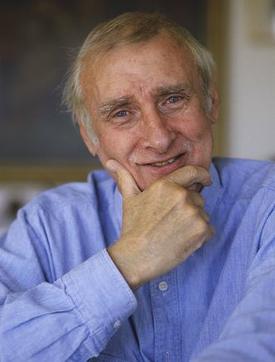
Terence Alan "Spike" Milligan was an Irish comedian, writer, musician, poet, playwright and actor. The son of an English mother and Irish father, he was born in British Colonial India, where he spent his childhood before relocating in 1931 to England, where he lived and worked for the majority of his life. Disliking his first name, he began to call himself "Spike" after hearing the band Spike Jones and his City Slickers on Radio Luxembourg.

The Goon Show is a British radio comedy programme, originally produced and broadcast by the BBC Home Service from 1951 to 1960, with occasional repeats on the BBC Light Programme. The first series, broadcast from 28 May to 20 September 1951, was titled Crazy People; subsequent series had the title The Goon Show.

The Martian Chronicles is a science fiction fix-up novel, published in 1950, by American writer Ray Bradbury that chronicles the exploration and settlement of Mars, the home of indigenous Martians, by Americans leaving a troubled Earth that is eventually devastated by nuclear war.
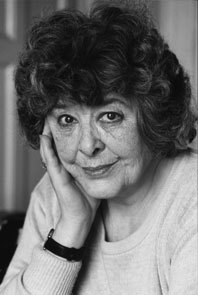
Diana Wynne Jones was a British novelist, poet, academic, literary critic, and short story writer. She principally wrote fantasy and speculative fiction novels for children and young adults. Although usually described as fantasy, some of her work also incorporates science fiction themes and elements of realism. Jones's work often explores themes of time travel and parallel or multiple universes. Some of her better-known works are the Chrestomanci series, the Dalemark series, the three Moving Castle novels, Dark Lord of Derkholm, and The Tough Guide to Fantasyland.
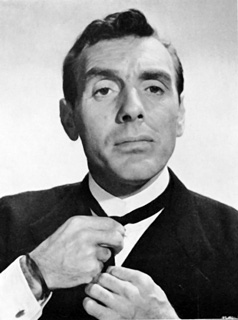
Eric Sykes was an English radio, stage, television and film writer, comedian, actor and director whose performing career spanned more than 50 years. He frequently wrote for and performed with many other leading comedy performers and writers of the period, including Tony Hancock, Spike Milligan, Tommy Cooper, Peter Sellers, John Antrobus and Johnny Speight. Sykes first came to prominence through his many radio credits as a writer and actor in the 1950s, most notably through his collaboration on The Goon Show scripts. He became a TV star in his own right in the early 1960s when he appeared with Hattie Jacques in several popular BBC comedy television series.

Donny Edward Hathaway was an American soul singer, keyboardist, songwriter, backing vocalist, and arranger who Rolling Stone described as a "soul legend". His most popular songs include "The Ghetto", "This Christmas", "Someday We'll All Be Free", and "Little Ghetto Boy". Hathaway is also renowned for his renditions of "A Song for You", "For All We Know", and "I Love You More Than You'll Ever Know", along with "Where Is the Love" and "The Closer I Get to You", two of many collaborations with Roberta Flack. He has been inducted into the St. Louis Walk of Fame and won one Grammy Award from four nominations. Hathaway was also posthumously honored with a Grammy Lifetime Achievement Award in 2019. Dutch director David Kleijwegt made a documentary called Mister Soul – A Story About Donny Hathaway, which premiered at the International Film Festival Rotterdam on January 28, 2020.

Anne Hathaway was the wife of William Shakespeare, an English poet, playwright and actor. They were married in 1582, when Hathaway was 26 years old and Shakespeare was 18. She outlived her husband by seven years. Very little is known about her life beyond a few references in legal documents. Her personality and relationship to Shakespeare have been the subject of much speculation by many historians and writers.
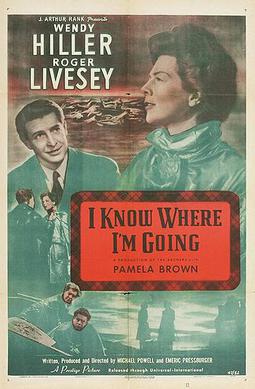
I Know Where I'm Going! is a 1945 romance film by the British-based filmmakers Michael Powell and Emeric Pressburger. It stars Wendy Hiller and Roger Livesey, and features Pamela Brown and Finlay Currie.

The Hour of the Dragon, also known as Conan the Conqueror, is a fantasy novel by American writer Robert E. Howard featuring his sword and sorcery hero Conan the Cimmerian. It was one of the last Conan stories published before Howard's suicide, although not the last to be written. The novel was first published in serial form in the December 1935 through April 1936 issues of the pulp magazine Weird Tales. The first book edition was published by Gnome Press in hardcover in 1950. The Gnome Press edition retitled the story Conan the Conqueror, a title retained by all subsequent editions until 1977, when the original title was restored in an edition published by Berkley/Putnam. The Berkley edition also reverted the text to that of its original Weird Tales publication, discarding later edits. Later editions have generally followed Berkley and published under the original title.
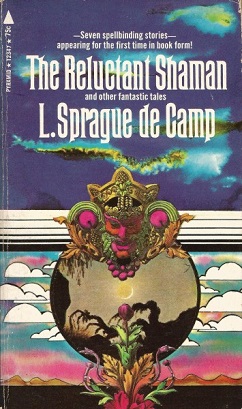
The Reluctant Shaman and Other Fantastic Tales is a collection of short stories by American science fiction and fantasy author L. Sprague de Camp, first published in paperback by Pyramid Books in November 1970. An E-book edition was published by Gollancz's SF Gateway imprint on September 29, 2011 as part of a general release of de Camp's works in electronic form. The pieces were originally published between 1939 and 1958 in the magazines Thrilling Wonder Stories, Unknown, and Fantastic Universe. The collection has also been translated into French and German.

Ella Enchanted is a 2004 jukebox musical fantasy comedy film directed by Tommy O'Haver and written by Karen McCullah Lutz and Kirsten Smith, loosely based on Gail Carson Levine's 1997 novel of the same name. Starring Anne Hathaway and Hugh Dancy, the film is a satire of the fairy tale genre.
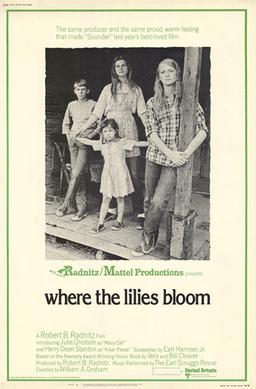
Where the Lilies Bloom is a 1974 American drama film directed by William A. Graham and starring Julie Gholson, Harry Dean Stanton, Rance Howard, and Jan Smithers. Based on the 1969 novel of the same name by Bill and Vera Cleaver, it follows four underage siblings in Appalachia who attempt to conceal the death of their widowed father to avoid being separated.
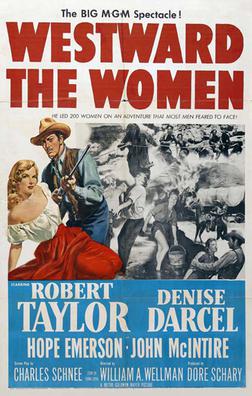
Westward the Women is a 1951 American western film directed by William A. Wellman and starring Robert Taylor, Denise Darcel and John McIntire.

China Girl is a 1942 drama film which follows the exploits of an American newsreel photographer in China and Burma against the backdrop of World War II. The film stars Gene Tierney, George Montgomery, Lynn Bari and Victor McLaglen, and was directed by Henry Hathaway. It is also known as A Yank In China, Burma Road and Over The Burma Road.
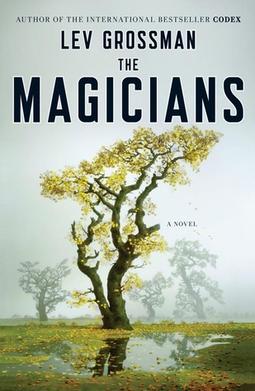
The Magicians is a new adult fantasy novel by the American author Lev Grossman, published in 2009 by Viking Press. It tells the story of Quentin Coldwater, a young man who discovers and attends a secret college of magic in New York. The novel received critical acclaim and was followed by a sequel, The Magician King, in 2011 and a third novel, The Magician's Land, in 2014.
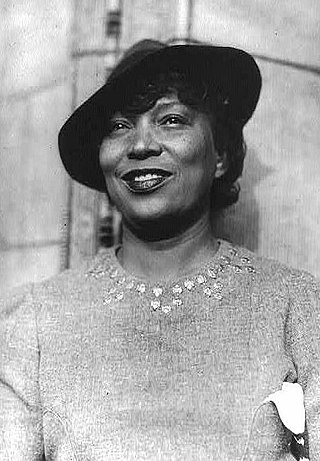
"Sweat" is a short story by the American writer Zora Neale Hurston, first published in 1926, in the first and only issue of the African-American literary magazine Fire!!. The story revolves around a washerwoman and her unemployed, insecure husband. The short story is 4743 words long, or around 15 pages.

Famous Five is a 2012 German children's film. Directed by Mike Marzuk, it is a film adaptation of The Famous Five series by Enid Blyton, which is based primarily on the 1947 book Five on Kirrin Island Again.

Eileen is a 2015 novel by Ottessa Moshfegh, published by Penguin Press. It is Moshfegh's first novel. It won the Hemingway Foundation/PEN Award for debut fiction and was shortlisted for the 2016 Man Booker Prize and the 2015 National Book Critics Circle Award. The novel was adapted into a 2023 film of the same name.
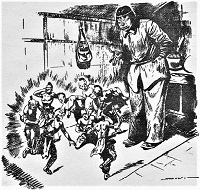
"The Reluctant Shaman" is a contemporary fantasy story by American writer L. Sprague de Camp. It was first published in the magazine Thrilling Wonder Stories for April 1947. It first appeared in book form in the collection The Reluctant Shaman and Other Fantastic Tales ; it later appeared in the magazine Science Fiction Yearbook no. 5 and the collection The Best of L. Sprague de Camp. The story has been translated into French and German.




















